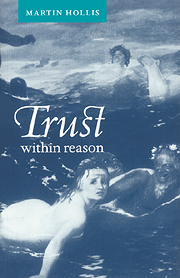7 - The bond of society
Published online by Cambridge University Press: 06 January 2010
Summary
The crux remains how Adam can resist the lure of The Extra Trick and how both Hume's farmers are to get their harvests in. The problem arose initially because prudence addressed Adam in a language of forward-looking reasons, concerned solely with what would secure better consequences for him, as measured by his preferences over the possible outcomes. It advised him to take The Extra Trick if given the chance. But it also advised the equally rational Eve not to give him the chance, whether or not they had made an agreement; and, since both knew it, the trail ended sadly at The Rational Choice. Similarly, prudence told the second farmer to defect and told the first farmer to expect a defection. So they both lost their harvests ‘for want of mutual confidence and security’. Trust had become rationally impossible. The point could be blunted by embodying a one-shot game in a series or by letting third parties know how these players had behaved for future reference. But it could not be so thoroughly overcome that cooperation became the basic form of social action, while prudence remained the governing idea. So, if prudence, speaking a language of homogenised utility and forward-looking reasons, is the voice of reason itself, then there is no trust within reason and critics will be right to say that the progress of Enlightenment destroys the bond of society.
Since then, we have tried complicating the character of a rational agent so that prudence can recommend indirect strategies. But neither a two-tiered preference structure nor a disposition to play fair with those who play fair could overcome the lure of a better bargain.
- Type
- Chapter
- Information
- Trust within Reason , pp. 126 - 142Publisher: Cambridge University PressPrint publication year: 1998



